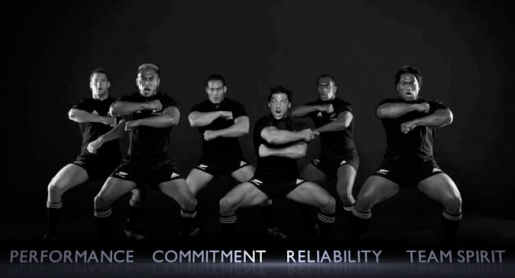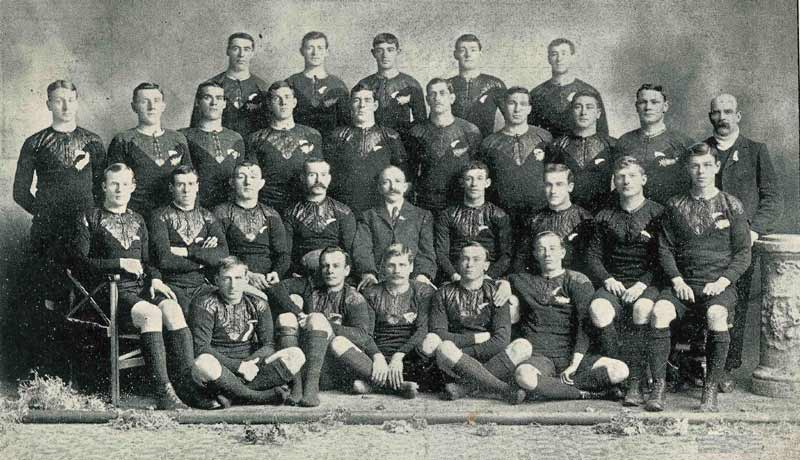by Tony Vidler ![]()
![]()
![]()

If you doubt that culture can create lasting success, then consider this:
Imagine a sports team (or club if you prefer) that competed continuously for well over 100 years and during that time had a winning record against all comers of over 83%? The best that every nation on earth can throw at you year after year after year…and you win 4 times out of 5…..whether you are playing in their backyard or yours. That is sustained success, and that is no accidental result.
The news that the NZ Rugby Union wants to sell a piece of the All Blacks got me thinking again about the importance of culture. 
The All Blacks have a phenomenal record and are arguably the most successful sports team in the world ever (and I am not an All Black supporter either, I assure you!). As with any incredibly successful organisation there are lessons for anyone else who aspires to achieve excellence.
With well over 1,000 players having represented the All Blacks during that time, it cannot simply be about having some good players. They have good players all the time. Year after year after year….in fact their very existence creates those good players for future years.
Rugby has become THE sport in New Zealand…but in part that is because the All Blacks give New Zealanders such a strong sense of pride and national identity. It follows that the culture of excellence and pattern of continual success attracts new talent to it, with the inevitable dream on the part of the many youngsters to be an All Black. So the culture that has bred success also perpetuates the ongoing success of itself – the sport attracts the majority of the best playing talent in the country. As the old saying goes: success breeds success.
From a business perspective this highlights the importance of building the right culture in an organization. High performance – or career success – creates a culture of pursuing excellence. That excellence and ongoing success then attracts the talent required to perpetuate the success.
But it clearly isn’t just about continuing to attract phenomenal athletes to the game. The success culture is more than just winning statistics…it is about values. Understanding the values that the All Blacks have built that culture around is where the real lessons are for us as business owners. Obviosuly as organisation they value high performance and success, but those are not their actual values. Winning is not an aspiration – it is an expectation. Commitment is fully committed.
One of those core values which shines through consistently is that while they frequently have superstars in their team, the team matters more than any superstar.

Any individual star must reflect the team values, or the team itself manages the individual – long before management have to intervene the players themselves are working to protect their collective identity and reputation.
In other words it is the practitioners (the players) who ensure compliance with their expected code and enforce standards. They don’t rely on outside parties to do it…each player knows that their own reputation and success is tied to the team brand and the teams success. It is perhaps not surprising that this is continually the most disciplined and well drilled rugby team in the world. They have an incredible work ethic….and practice, practice, practice in the pursuit of perfecting their business. A significant part of that is the continual pressure from new talent trying to break into the team of course…the relentless pressure of every spot in the team being constantly under threat from yet another phenomenal talent coming through.
But the culture of the team is built upon some very simple unshakeable core values. Those that do not reflect the values do not get to stay – no matter how talented they are as athletes.
The culture has its rituals – many of which will never be known by distant outsiders like myself. But one particular ritual intrigues me enormously.
The All Blacks are famous for performing a traditional Maori challenge – The Haka before a game. They literally challenge the oppostion to do their damndest. hey do it against all comers before a game – lay down the challenge openly and aggressively – and say “here we are; come at us”. That is a ritual and which reinforces the concept that they are one tight unit….but that is not the cultural element which is so intriguing.
What is intriguing is that when a new member of the team joins the All Blacks the incumbent team members welcome the new member with a personal Haka apparently. Think about the power of that. The immediate respect accorded to the new member simply for making the top team. The underlying challenge to excel and bring the best you’ve got. The reinforcement that the newest member is joining an outfit that has a longstanding culture and it is incumbent upon THEM to fit in with it…
All of the history, the culture, the kudos and mana that the All Blacks have is thrown down in a welcoming gesture to their newest member – yet it is also an act that establishes the highest of expectations immediately.
The culture is worked on deliberately and passed on continually. Performance matters. Reliability matters. Commitment matters. The Team matters. Those are the core values.
Within that culture is a recognition and acceptance that change and constant innovation are required to stay on top. Every All Black team enters a new “business season” with a clear plan about how they will innovate and perform better than they did the year before. They know that what worked yesterday is probably not going to be good enough tomorrow.
Performance matters.
The All Blacks are not just a sports team, they are big business, which is why they are thinking of taking on external investors I guess. Their commitment to maintaining a culture of excellence, performance, innovation and respect is evident and big business now wants a piece of that.
Their culture is what underpins the sustained success of the organisation regardless of what playing talent is on the roster in any given season, and that is what the All Blacks must be careful not to dilute.
That is the key lesson for any service business that wants to build lasting success: build the culture for sustained success and then safe-guard it jealously.






Comments (0)